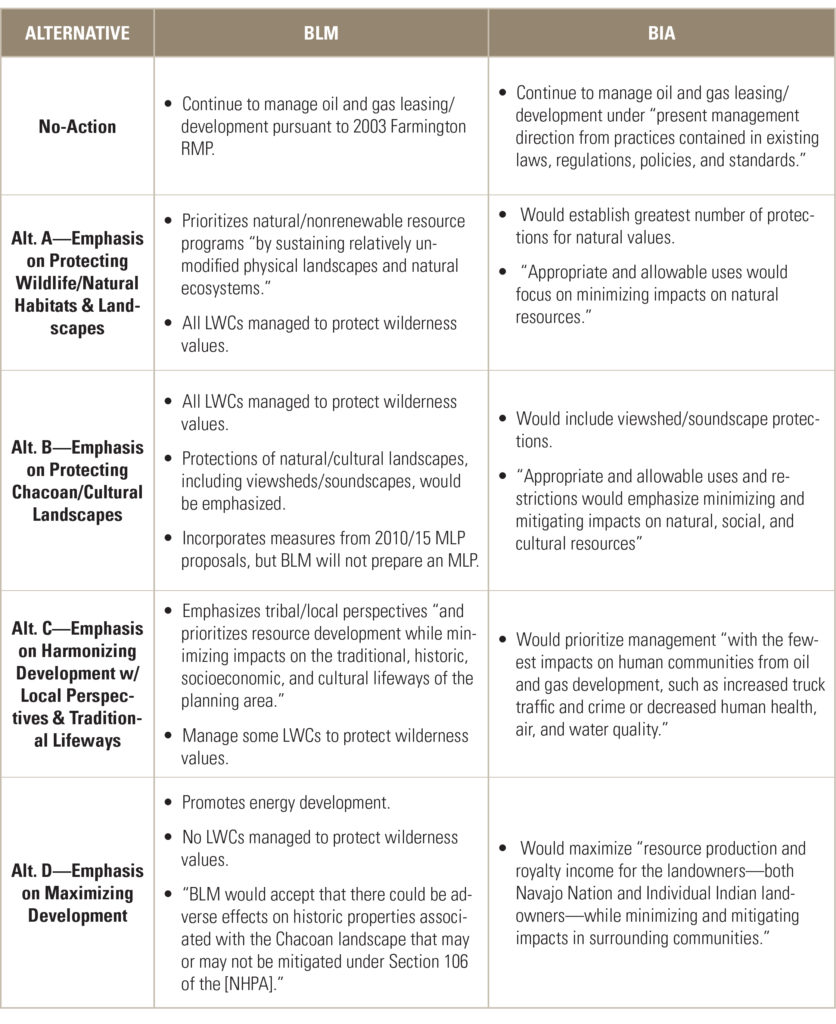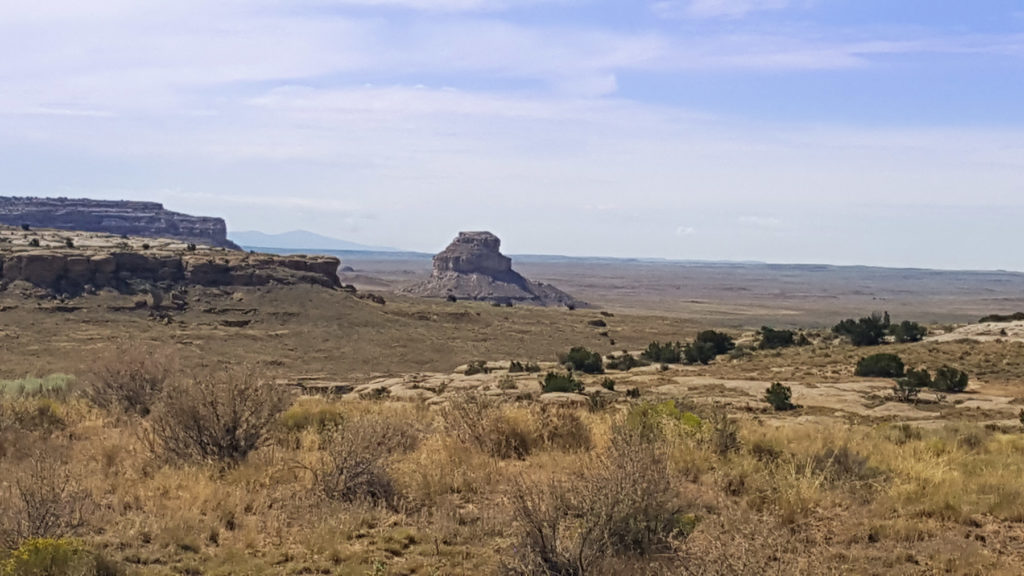- Home
- >
- Preservation Archaeology Blog
- >
- Protecting the Greater Chaco Landscape: February 2...

(February 2, 2018)—Two things of importance happened this week with implications for protection of the Greater Chaco Landscape.
First, the Bureau of Land Management (BLM) Farmington Field Office and Bureau of Indian Affairs (BIA) Gallup Office released their alternatives for the Environmental Impact Statement (EIS) and amendment to the Resource Management Plan (RMP) for the Mancos-Gallup Shale development.
Second, BLM (Washington D.C. office) announced the end of the Master Leasing Plan (MLP) policy, along with other policies in place since 2010.
Here are the alternatives in summary form, with some discussion (thanks to Ti Hays):
- BLM and BIA are independently evaluating five alternatives. According to the newsletter: “These alternatives are reasonable and respond to the project purpose and need, are technically and economically feasible, and are consistent with the basic policy and management objectives for the BIA and BLM.”
- Neither BLM nor BIA have identified a “preferred” alternative.
- BLM/BIA are not accepting comments or hosting any meetings in connection with the preliminary alternatives.
Here’s a quick summary of the preliminary alternatives:

We are opposed to the No-Action Alternative, which maintains the status quo and does not adequately protect the GCL. We are also opposed to Alternative D, which would maximize energy development, at the expense of every other value.
We must admit some confusion over Alternatives A through C. These emphasize different types of protection: Alt. A = environmental protections; Alt B = cultural resource protections; Alt C = protection of current, traditional lifeways and people on the landscape. We consider all three to be very worthy of protection and believe that all could be protected with a single alternative. We wonder why BLM and BIA appear to pit these values against each other, instead of recognizing the significant overlap and proposing a single alternative.
The second piece of news relating to the Greater Chaco Landscape is far more disturbing. BLM has announced the end of the Master Leasing Plan (MLP) approach, along with termination of numerous policies put in place in 2010, after extensive negotiation among BLM, industry, and environmental and preservation groups.
Among the change to policy, in addition to ending use of the MLP approach (thanks to Matt Kirby):
- BLM must process lease nominations within 60 days
- Public participation is now optional—“State and field offices may provide for public participation during the NEPA (National Environmental Policy Act) process as part of the review of parcels identified for potential leasing.”
- NEPA is optional for lease sales—and encourages use of Determination of NEPA Adequacy (which are not NEPA documents and are an inadequate substitution for the NEPA process)
- Site visits are not required
- BLM can change lease stipulations without an amendment
- 45-day notice of lease sale
- 10 days to protest once sale is finalized
- Commitment to resolve protests within 60 days of lease sales
- No longer rotating sales around regions
- Can use regional teams to address leases and protests
- Deletes language that declared that “there was no presumed preference for oil and gas” over other uses on public lands.
Here are our summary thoughts on BLM’s changes to MLPs and other policies:
- Today, Secretary Zinke and the Bureau of Land Management (BLM) released their Instruction Memorandum, formally rescinding the Master Leasing Plan policy that was put in place to protect our national parks and public lands from drilling and to restore balance across our landscapes consistent with BLM’s multiple-use mandate.
- With broad support from communities across the West, MLPs have created certainty for all users of public lands and were helping to direct oil and gas drilling away from our parks, hiking trails, and other important resources.
- In addition to taking an axe to this commonsense policy, the BLM has also effectively silenced the voices of hundreds of thousands of stakeholders across the West going forward by making public participation optional during the NEPA process in reviewing potential lease sales on public lands. This gives the oil and gas industry preferred treatment and an inside track on leasing even more public lands for drilling—at a time when the industry is sitting on nearly 8,000 unused drilling permits and nearly 15 million acres of unused leases.
- For seven years, MLPs have been known across the West as a commonsense approach to lands management. They allowed stakeholders on the ground to work together to create landscape-level plans aimed at protecting outdoor recreation opportunities and providing economic certainty to local businesses and all industries that benefit from public lands.
- The MLP policy also ensured that everyone who cares about public lands—from county commissioners to sportsmen to Native Americans—had a say before leases or permits were given to the oil and gas industry.
- MLPs were created in order to resolve the disconnect between Washington D.C. and the West, and for seven years they have been doing just that. Thwarting these efforts simply puts the future of the West in the hands of Washington oil and gas lobbyists—ripping them away from the people who live, work, and recreate on these landscapes.
- Instead of upholding this successful policy, Secretary Zinke and the Trump administration have turned their backs and have chosen to side with their friends in the oil and gas industry, rubber-stamping their “energy dominance” agenda at the expense of outdoor recreation opportunities—like hunting and fishing—and drinking water protections for Western communities.
- By allowing this unwanted and unwarranted change, Washington is trading the West’s economic well-being and future generation’s outdoor heritage for uncertainty and conflict—something nobody, including industry, wants.
- Westerners will continue to stand up for their landscapes, because they are valuable well beyond the natural resources beneath the surface, and will demand that our leaders in Washington consider the grave economic and environmental consequences of unchecked oil and gas development before selling off our iconic landscapes to the highest bidder.

Read Senator Udall’s (D-NM) statement here. Excerpt:
WASHINGTON — Today, U.S. Senator Tom Udall responded to the Bureau of Land Management’s (BLM) abrupt decision to weaken its oil and gas leasing review process, shutting out public comments and accelerating potential leases to oil and gas companies. The changes reversing a number of Obama administration reforms were published in an “Instruction Memorandum” this week. Udall said he was particularly concerned about how the change will affect the sensitive areas around Chaco Culture National Historical Park, which the BLM and the Bureau of Indian Affairs (BIA) are currently reviewing at Udall’s request to plan the most appropriate way to balance resource development and protect unique archaeological sites and the communities in the surrounding landscape.
We second Senator Udall’s comments and urge the Trump administration to restore the public process for oil-gas leasing.